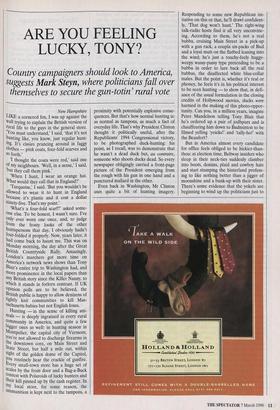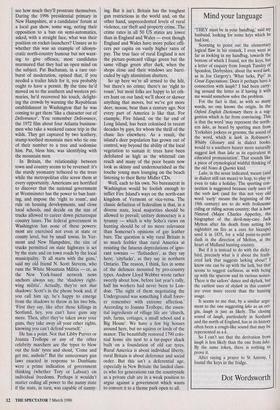ARE YOU FEELING LUCKY, TONY?
Country campaigners should look to America,
suggests Mark Steyn, where politicians fall over
themselves to secure the gun-totin' rural vote
New Hampshire LIKE a cornered fox, I was up against the wall trying to explain the British version of rural life to the guys in the general store. You must understand,' I said, 'that it's not hunting like, you know, just regular hunt- ing. It's cissies prancing around in faggy clothes — pink coats, four-fold scarves and so forth.'
`I thought the coats were red,' said one of my neighbours. 'Well, in a sense,' I said, but they call them pink.' `When I hunt, I wear an orange hat. What would they call that in England?'
`Turquoise,' I said. 'But you wouldn't be allowed to wear it to hunt in England because it's plastic and it cost a dollar ninety-five. That's my point.' `What's a four-fold scarf?' asked some- one else. To be honest, I wasn't sure. I've only ever worn one once, and, to judge from the frosty looks of the other huntspersons that day, I obviously hadn't four-folded it properly. Now, years later, it had come back to haunt me. This was on Monday morning, the day after the Great British Countryside Rally. Amazingly, London's marchers got more time on America's net-work news shows than Tony Blair's entire trip to Washington had, and More prominence in the local papers than any British story since the Killer Nanny, to Which it stands in forlorn contrast. If UK opinion polls are to be believed, the British public is happy to allow denizens of tightly knit communities to kill Mas- sachusetts babies but not English foxes. Hunting — in the sense of killing ani- mals — is deeply ingrained in every rural refinmunity in America, and quite a few 15igger ones as welt: in hunting season in Montpelier, the capital city of Vermont, You're not allowed to discharge firearms in the downtown core, on Main Street and State Street, but half a mile out, within sight of the golden dome of the Capitol, You routinely hear the crackle of gunfire. Every small-town store has a huge set of scales by the front door and a Bag-a-Buck contest with Polaroids of lucky hunters and their kill pinned up by the cash register. In my local store, for some reason, the ammunition is kept next to the tampons, a proximity with potentially explosive conse- quences. But that's how normal hunting is: as normal as tampons, as much a fact of everyday life. That's why President Clinton thought it politically useful, after the Republicans' 1994 Congressional victory, to be photographed duck-hunting: his point, as I recall, was to demonstrate that he wasn't a dead duck but, au contraire, someone who shoots ducks dead. So every newspaper obligingly carried a front-page picture of the President emerging from the rough with his gun in one hand and a punctured mallard in the other.
Even back in Washington, Mr Clinton uses quite a bit of hunting imagery. Responding to some new Republican ini- tiative on this or that, he'll drawl confident- ly, 'That dog won't hunt.' The right-wing talk-radio hosts find it all very unconvinc- ing. According to them, he's not a real bubba, cruising Main Street in a pick-up with a gun rack, a coupla six-packs of Bud and a loyal mutt on the flatbed leaning into the wind; he's just a touchy-feely huggy- weepy wussy-pussy type pretending to be a bubba in order to lure back all the real bubbas, the disaffected white blue-collar males. But the point is, whether it's real or phoney, he feels it's in his political interest to be seen hunting — to show that, in defi- ance of the usual formulation in the closing credits of Hollywood movies, ducks were harmed in the making of this photo-oppor- tunity. Can you, in a million years, imagine Peter Mandelson telling Tony Blair that he's ordered up a pair of jodhpurs and is chauffeuring him down to Badminton to be filmed yelling `yoicks!' and `tally-ho!' with the Beaufort?
But in America almost every candidate for office feels obliged to be hickier-than- thou: at election time, Beltway insiders who sleep in their neck-ties suddenly clamber into boots, denims, plaid and cowboy hats and start stumping the hinterland profess- ing to like nothing better than a jigger of moonshine and a bunk-up with their sister. There's some evidence that the yokels are beginning to wind up the politicians just to see how much they'll prostrate themselves. During the 1996 presidential primary in New Hampshire, at a candidates' forum at a local gun show, some wag, noting their opposition to a ban on semi-automatics, asked, with a straight face, what was their position on rocket-launchers? Unsure as to whether this was an example of idiosyn- cratic north-country humour but not want- ing to give offence, most candidates murmured that they had an open mind on the subject. Pat Buchanan, in a rare out- burst of moderation, opined that, if you needed a trailer hitch for it, you probably ought to have a permit. By the time he'd moved on to the southern and western pri- maries, he'd recovered his touch, delight- ing the crowds by warning the Republican establishment in Washington that he was coming to get them 'like a character out of Deliverance'. You remember Deliverance, the 1972 film about four Atlanta business- men who take a weekend canoe trip in the wilds. They get captured by two leathery, stump-toothed mountain men who tie one of their number to a tree and sodomise him. Pat, bless him, was identifying with the mountain men.
In Britain, the relationship between town and country seems to be reversed: it's the sturdy yeomanry tethered to the trees while the metropolitan elite screw them at every opportunity. Americans are horrified to discover that the national government at Westminster has the power to ban hunt- ing, and impose the 'right to roam', and rule on housing developments, and close local schools, and decide on the size of trucks allowed to career down picturesque country lanes. The federal government in Washington has none of these powers: most are exercised not even at state or county level, but by small towns. In Ver- mont and New Hampshire, the size of trucks permitted on state highways is set by the state and on town roads by the local municipality. 'It all starts with the guns,' said my old friend N. Scott Stevens, who runs the White Mountain Militia — or, as the New York-based network news anchors always say, the 'shadowy right- wing militia'. Actually, they're not that shadowy: Scott's in the phone book and, if you call him up, he's happy to emerge from the shadows to throw in his two bits.. `First they say, like after those killings in Scotland, hey, you can't have guns any more. Then, after they've taken away your guns, they take away all your other rights, knowing you can't defend yourself.'
He has a point. Not that Libby Purves or Joanna Trollope or any of the other celebrity marchers are the types to blow out the feds' tyres and shout, 'Come and get me, asshole!' But the unnecessary gun laws enacted in response to Dunblane were a prime indication of government thinking (whether Tory or Labour) on individual freedoms. Perhaps it wouldn't matter ceding all power to the nanny state if the state, in turn, was capable of nanny- ing. But it isn't. Britain has the toughest gun restrictions in the world and, on the other hand, unprecedented levels of rural violence, car theft and property crime. The crime rates in all 50 US states are lower than in England and Wales — even though England and Wales have more police offi- cers per capita on vastly higher rates of pay. The true face of rural England is not the picture-postcard village green but the same village green after dark, when the shops close and their windows are barri- caded by ugly aluminium shutters.
So up here we're all armed to the hilt, but there's no crime; there's no 'right to roam', but most folks are happy to let oth- ers hunt on our land; we'll shoot or skewer anything that moves, but we've got more deer, moose, bear than a century ago. Not every part of America is like that. For example, Fire Island, on the far end of Long Island, has been colonised in recent decades by gays, for whom the thrill of the chase lies elsewhere. As a result, the island's deer population has grown out of control, way beyond the ability of the local vegetation to sustain it: trees have been defoliated as high as the whitetail can reach and many of the poor beasts now look as skinny and undernourished as the louche young men lounging on the beach listening to their Bette Midler CDs.
Well, each to his own. No bureaucrat in Washington would be foolish enough to inflict Fire Island's ways on the north-east kingdom of Vermont or vice-versa. The classic definition of federalism is that, in a diverse state, local majorities should be allowed to prevail; unitary democracy is a tyranny — which is why Soho's views on hunting should be of no more relevance than Somerset's opinions of gay leather bars. The question is why rural Britain is so much feebler than rural America at resisting the fatuous depredations of igno- rant townies — 'flatlanders', as they say here; 'cityfucks', as they say in northern Ontario. The reason, I think, lies in some of the defences mounted by pro-country types. Andrew Lloyd Webber wrote rather sweetly about how, before last year's rally, half his workers had never been to Lon- don: 'The sight of them negotiating the Underground was something I shall forev- er remember with extreme affection.' According to Joanna Trollope, the essen- tial ingredients of village life are 'church, pub, farms, cottages, a small school and a Big House'. We have a few big houses around here, but no squires or lords of the manor. The beautifully restored 1790 colo- nial home sits next to a tar-paper shack built on a foundation of old car tyres. Rural America is about individual liberty, rural Britain is about deference and social order. But this isn't a deferential age, especially in New Britain: the landed class- es who for generations ran the countryside as a private club are in a weak position to argue against a government which wants to convert it to a theme park open to all.



























































 Previous page
Previous page